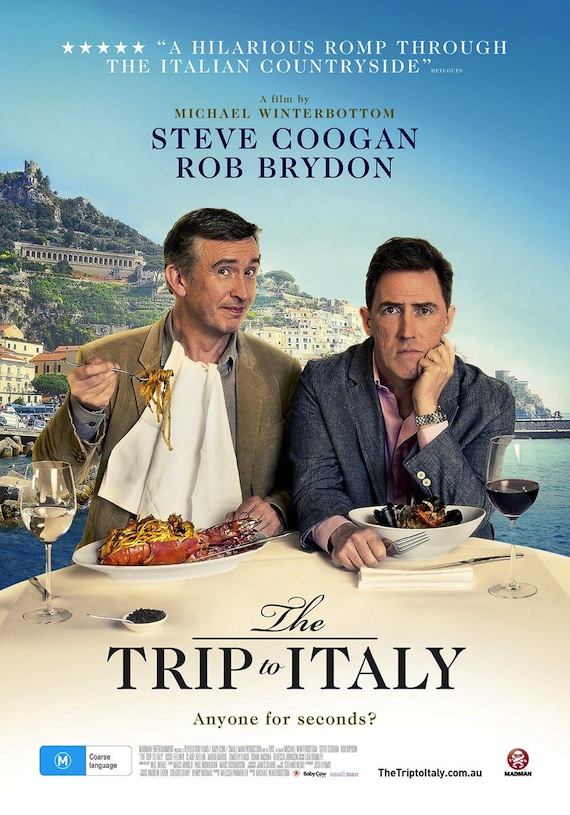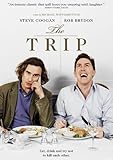
“To read a good comedy,” wrote William Hazlitt, is to keep the best company in the world, where the best things are said…” Said in the voices of Michael Caine, Anthony Hopkins, Al Pacino, and Hugh Grant, Hazlitt might have added, had he lived to see The Trip to Italy, the latest collaboration between director Michael Winterbottom and the comic team of Steven Coogan and Rob Brydon.
 In The Trip to Italy and its precursor, The Trip (both originally shot as BBC mini-series), Coogan and Brydon play fictionalized versions of themselves, doing impressions, riffing and sparring with each other as they drive around the Lake District or Italy. They are on assignment for the Observer, which in each case has enlisted them to write a series of amateur restaurant reviews. Proceeding from such a wonderfully slight premise — comedy, like dough, is best not overworked — the pair set off on a well-fed pilgrimage to poetic shrines (Wordsworth and Coleridge’s in the first, Byron and Shelley’s Mediterranean haunts here). Balancing out the high culture are lengthy discussions of pop stars and loving recitations from Hollywood films.
In The Trip to Italy and its precursor, The Trip (both originally shot as BBC mini-series), Coogan and Brydon play fictionalized versions of themselves, doing impressions, riffing and sparring with each other as they drive around the Lake District or Italy. They are on assignment for the Observer, which in each case has enlisted them to write a series of amateur restaurant reviews. Proceeding from such a wonderfully slight premise — comedy, like dough, is best not overworked — the pair set off on a well-fed pilgrimage to poetic shrines (Wordsworth and Coleridge’s in the first, Byron and Shelley’s Mediterranean haunts here). Balancing out the high culture are lengthy discussions of pop stars and loving recitations from Hollywood films.
Despite their apparent casualness, the two films reveal a chiastic structure that reverses the men’s personal and professional fortunes. In the first, Coogan reluctantly invites Brydon on the trip he had originally planned to take with his girlfriend, mulls moving to Hollywood to film a project, and ends up moping around his austere London apartment. By contrast, we last see Brydon eating a homemade meal with his adoring wife, whom he promises never to leave for more than three days again. In the sequel, Brydon invites Coogan on the trip, auditions for his own Hollywood part as a mob accountant in a Michael Mann film (which irritates and baffles Coogan in equal measure), and is in no particular rush to return to his wife after conducting an affair with a younger woman. Coogan, meanwhile, has just had his American series Pathological cancelled and seems ready to leave Hollywood and rededicate himself to fatherhood.
 The men are friends, even if their relationship is often marked by needling, jealousy, frustration, hostility, exhaustion, and indifference. (When Brydon mentions his wife’s name at the beginning of the movie, Coogan has no idea who he’s talking about.) Coogan is the more saturnine of the two, harboring largely unrealized dreams of Hollywood dramatic success, and reading Byron in bed at night. The antic Brydon, who rents a Mini Cooper for the journey just to give himself an occasion to quote Michael Caine from The Italian Job, is always ready to slip into an inspired bit or impression, from Richard Burton to Gore Vidal. He soldiers on throughout, determined to combat his companion’s glumness and belittlements with incessant, exhausting cheer.
The men are friends, even if their relationship is often marked by needling, jealousy, frustration, hostility, exhaustion, and indifference. (When Brydon mentions his wife’s name at the beginning of the movie, Coogan has no idea who he’s talking about.) Coogan is the more saturnine of the two, harboring largely unrealized dreams of Hollywood dramatic success, and reading Byron in bed at night. The antic Brydon, who rents a Mini Cooper for the journey just to give himself an occasion to quote Michael Caine from The Italian Job, is always ready to slip into an inspired bit or impression, from Richard Burton to Gore Vidal. He soldiers on throughout, determined to combat his companion’s glumness and belittlements with incessant, exhausting cheer.
 When Coogan does occasionally lighten up, often in the midst of the multi-course meals that are ostensibly their reason for being together, the two embark on inspired flights of fancy in which the full splendor of their comic romance becomes momentarily visible. In The Trip To Italy, it’s on full display in an extended gag about a cowed assistant director asking Tom Hardy’s Bane and Christian Bale’s Batman from The Dark Knight Rises to enunciate and receiving profane, garbled replies. In The Trip, the best moment comes when they spoof the pre-fight battle speeches of historical epics: “Gentlemen, to bed, for tomorrow we rise at dawn.” By the end, Coogan’s blustery liege and Brydon’s obsequious aide-de-camp have pushed back the departure to 9:30ish, which allows for a quick continental breakfast and warm-up run. We then witness them engaged in a perfectly unmotivated a cappella scat session, a wordless duet as fun as the oratorical comedy that precedes it.
When Coogan does occasionally lighten up, often in the midst of the multi-course meals that are ostensibly their reason for being together, the two embark on inspired flights of fancy in which the full splendor of their comic romance becomes momentarily visible. In The Trip To Italy, it’s on full display in an extended gag about a cowed assistant director asking Tom Hardy’s Bane and Christian Bale’s Batman from The Dark Knight Rises to enunciate and receiving profane, garbled replies. In The Trip, the best moment comes when they spoof the pre-fight battle speeches of historical epics: “Gentlemen, to bed, for tomorrow we rise at dawn.” By the end, Coogan’s blustery liege and Brydon’s obsequious aide-de-camp have pushed back the departure to 9:30ish, which allows for a quick continental breakfast and warm-up run. We then witness them engaged in a perfectly unmotivated a cappella scat session, a wordless duet as fun as the oratorical comedy that precedes it.
 But beneath the laughs, of which there are many, The Trip to Italy is an anxious comedy supremely anxious about comedy itself. In a previous collaboration with the pair, Tristram Shandy: A Cock and Bull Story, Winterbottom expressed similar anxiety. Like the unruly autobiographical tale on which it is based, the film struggles to take shape, prompting the director and writers to ponder why they are taking a year out of their lives to make it. “Because it’s funny,” is one answer. When the director is asked, “Is that all?”, he replies: “Isn’t that enough?” It isn’t necessarily enough for Coogan, who in the course of insulting “inferior talents” like Brydon worries whether he as a comedian will be remembered as Byron and Shelley are. It is no wonder that Coogan has in his arsenal Hamlet’s “Alas, Poor Yorick!” speech, which he delivers to a blanching Brydon in a Neapolitan, skull-filled crypt:
But beneath the laughs, of which there are many, The Trip to Italy is an anxious comedy supremely anxious about comedy itself. In a previous collaboration with the pair, Tristram Shandy: A Cock and Bull Story, Winterbottom expressed similar anxiety. Like the unruly autobiographical tale on which it is based, the film struggles to take shape, prompting the director and writers to ponder why they are taking a year out of their lives to make it. “Because it’s funny,” is one answer. When the director is asked, “Is that all?”, he replies: “Isn’t that enough?” It isn’t necessarily enough for Coogan, who in the course of insulting “inferior talents” like Brydon worries whether he as a comedian will be remembered as Byron and Shelley are. It is no wonder that Coogan has in his arsenal Hamlet’s “Alas, Poor Yorick!” speech, which he delivers to a blanching Brydon in a Neapolitan, skull-filled crypt:
Where be your gibes now? your
gambols? your songs? your flashes of merriment,
that were wont to set the table on a roar? Not one
now, to mock your own grinning? quite chap-fallen?
A momentary chap-fallen Brydon is, in a first, left speechless.
The Trip to Italy frets over much else besides the artistic importance of its comedic genre. The movie is anxious about sequels, of which it is one; anxious about male friendships (evidenced by some puerile gay jokes); anxious about aging and mortality, as seen in the lingering shots of Pompeii, Naples’s Cimiterio delle Fontanelle, and Shelley’s grave; anxious about morality, particularly about which transgressions cannot be laughed off; and finally anxious about comic masks, whether it is ever possible for a comedian to confront the “brutal reality” of life: “Behind every pithy, vaguely amusing little joke is a cry for help,” Coogan says in a mock-eulogy of Brydon at Bolton Abbey in The Trip.
Coogan is of course just as unwilling to confront said reality. While Brydon’s compulsion to recite poetry in one of his celebrity imitation voices is a source of great frustration to his more serious companion, who sees in his friend’s comic deflation of high art a frustrating evasion, Coogan’s self-deluded view of himself as a Byronic figure — Brydon suggests his friend write a “Childe Steve’s Pilgrimage” — is a version of the same evasive impulse. What Henri Bergson said about the comic artist applies to both men:
However interested a dramatist may be in the comic features of human nature, he will hardly go, I imagine, to the extent of trying to discover his own. Besides, he would not find them, for we are never ridiculous except in some point that remains hidden from our own consciousness.
To wit: When the two comics pause to examine a petrified Pompeian corpse preserved in a glass bier, Coogan’s bathetic musings on death are in a way as deflective as Brydon’s decision to break out his famed “small man trapped in a box” voice and discuss footwear with the sandaled ancient. Masks come in different styles.
Once or twice these masks come off — to an extent. After a riotous lunch late in the film, Brydon, who has demonstrated little guilt for his infidelity, comes clean about the affair to Emma, Coogan’s pregnant assistant. Still laughing from Brydon’s humorous confession — delivered in his Hugh Grant voice — she demurs when asked for her advice, explaining that a hormonal pregnant woman might not be the best person to ask. Her lingering smile is one of the most ambivalent moments in the film, laughter and disappointment at war on her face. She can’t bring herself to deliver a moral judgment to the comic mask that delights her even as it reveals an unpalatable truth; the film slyly counts on the same from viewers. I’m not suggesting that one needs adopt a sententious stance on adultery, only that by tarnishing Brydon’s goofy, family-man image, the film demonstrates the powerful sense of complicity created by laughter.
The Trip to Italy is more than just funny — though that would be enough. It is a sneakily moral tale about historical figures (Byron, Casanova) renowned for their amorality; a capacious comedy about two rather narrow, inflexible characters; and a vivacious lark so haunted by death that by the final credits the title has acquired a newly metaphysical import. Each comedian, masked though he may be, knows exactly where the trip is ultimately headed.








